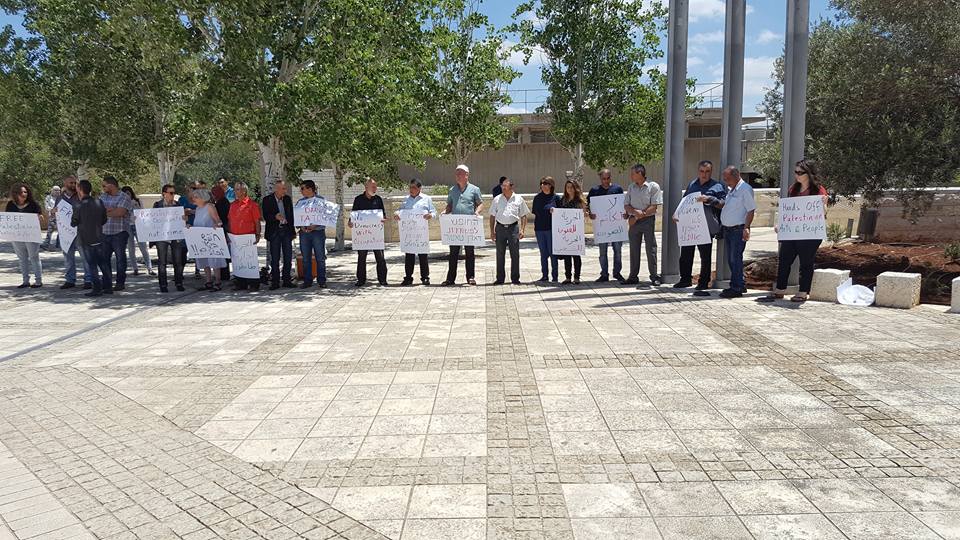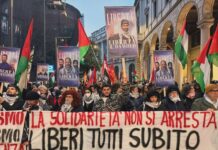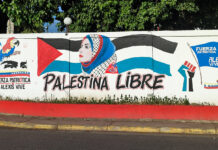
Palestinian poet Dareen Tatour faced an Israeli court hearing on Sunday, 8 May. Closed to the public after a large number of supporters showed up to express their support of the Palestinian poet, the court heard testimony from an Israeli police officer about the contents of Dareen’s smartphone and computer. Dareen is currently held under house arrest and prohibited from access to the internet. The next hearing in the case was set for 17 July. In order to support Dareen’s case, please follow the Free Dareen Tatour facebook page.
The following report on the hearing and the solidarity protest is reprinted from Free Haifa. Photo above by Yoav Haifawi.
Nazareth vigil supporting poet Dareen Tatour and the court hides behind closed doors
It is almost 7 months since Dareen Tatour, a Palestinian poet from Al-Reineh (near Nazareth), fell into the black hole of persecution by Israel’s oppression apparatus. The case was rarely noticed before the first hearing of the court on April 13 (see reports in Arabic and Hebrew), when it was published that the main accusation against her is posting a poem on youtube and Facebook calling for resistance to the occupation. Apparently Israel expects all Palestinian poets to devote their poems to pour praise and show love for their torturers.
The new “Free Dareen Tatour” Facebook page called for a vigil in front of the Nazareth court before the second hearing of the prosecution witnesses today, May 8 2016. By 12:00, the designated time, there was already a dedicated group of activists waiting in the sun in front of the court building. They received gleefully Dareen that had to travel a hundred kilometers from her exile and home-detention in a suburb of Tel Aviv. Many of the activists (and some of her family members) didn’t see Dareen since her detention, and it was a very warm meeting.
There were signs in Arabic, Hebrew and English, all calling for the freedom of Dareen Tatour, freedom to Palestinian arts, free speech and freedom to the people. People kept coming and we kept writing new signs to let them all show their solidarity. Many Palestinian journalists and a team from Haaretz were busy taking photos and making interviews, as can be seem from the multitude of news items about the event that were published today.
Finally a group of high-school students that came to visit the court as part of their “citizenship” class joined the demonstration. They were taking pictures of themselves, proving in practice that this time they really learned something about democracy and freedom of expression and the need to struggle for them.
At 13:15 we packed the vigil and some 50 of Dareen’s supporters entered the court’s building in order to attend the hearing, filling all the waiting halls in the second floor. We had to wait more than an hour before the previous (closed) hearing finished. But as we gathered to enter the courtroom we were blocked by the guards. They announced that the hearing will be held behind closed doors.
With no legal grounds, Judge Adi Bambiliya decided that it will be more pleasant and efficient to shut out Dareen’s family and supporters, including Knesset members Haneen Zoabi and Basel Ghattas. After some time Dareen’s father, alone, was allowed in. Only at 16:55, after almost all the supporting public went away in despair, the ten of us that still hanged around were allowed in.
All that the court achieved today was hearing one more policeman witness for the prosecution, named Salman ‘Amer. He is the guy that inspected Dareen’s smartphone and computer. From his words in court he seems not to be much of a computer expert, just like the policemen translator of Dareen’s poem, who witnessed in the previous hearing, had no qualifications in poetry or translation.
What we did learn about was the police’s racist viewpoint that stands behind the whole persecution of Dareen, like thousands of more Palestinians:
- The witness mentioned many times that he had found in Dareen’s smartphone and computer “a picture of the ‘Mekhabelet’ from Afula”. ‘Mekhabel’ is a special Hebrew word for Palestinian resistance fighters, designated to de-humanize them. But Israa Abed, the women that was shot in Afula central station, was harmless and defenseless. Luckily she survived her cold-blood shooting – and was not accused by the Israeli police of any security offences.
- One special ‘accusation’ against Dareen, coming up in Amer’s written testimony, was that she read a poem in “Woman’s Day” in Nazareth. My feminist friends commented that educated women are really a great danger to the regime.
- Another proof of Dareen’s criminality, according to Amer, was that she participated in commemorating the Kafr Qasim massacre. On October 29, 1956, the Israeli army declared a curfew in Kafr Qasim near Tel Aviv, and killed 49 innocent Palestinians, mostly coming back from their fields or work and not knowing that they are in breach of the army’s orders. To the question of Abed Fahoum, the defense lawyer, what is wrong about commemorating this massacre Amer replied that it is “politics” and “goes against state security”!
Before we dispersed the judge tried to convince the parties to negotiate an agreed settlement. She told the defense lawyer that he should forget about abolishing the indictment. But she also pressed the prosecution to notice that they have some deep flaws in their case. The super-motivated prosecution lawyer, Elina Hardak, who doesn’t spare any effort to make life harder for Dareen, said that she can’t give ground. She claimed that the State Prosecutor and the Attorney General stand behind the case.
The hearing finished at 18:00. There are 5 more witnesses for the prosecution, and the next hearing was set for July 17, at 16:00. Another hearing was set for September 6. By this schedule Dareen will be denied her basic freedoms for more than a year before her case will be decided.
Discover more from Samidoun: Palestinian Prisoner Solidarity Network
Subscribe to get the latest posts sent to your email.




